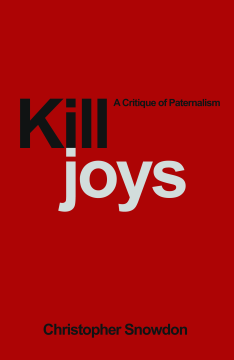
Additional Information
Book Details
Abstract
Eating sugary food, drinking alcohol and smoking cigarettes are legal activities. But politicians still use the law to discourage them. They raise their price, prohibit or limit their advertisement, restrict where they can be sold and consumed, and sometimes ban them outright. These politicians thereby violate John Stuart Mill’s famous principle that people should be free to do whatever they like, provided they harm no one but themselves. Why? What can justify these paternalistic policies? Killjoys reviews the full range of justifications that have been offered: from the idea that people are too irrational to make sensible decisions to the idea that they are effectively compelled by advertising to harm themselves. The author, Christopher Snowdon, exposes the logical or factual errors that undermine each purported justification. He thus provides a comprehensive critique of the health paternalism that has been adopted by governments around the world.
Table of Contents
| Section Title | Page | Action | Price |
|---|---|---|---|
| _GoBack | 36 | ||
| The author | x | ||
| Foreword | xi | ||
| 1\tPaternalism and liberalism | 1 | ||
| The liberal view | 3 | ||
| 2\tThe classical economist’s view | 10 | ||
| 3\tSoft paternalism and nudge theory | 16 | ||
| 4\tCoercive paternalism | 27 | ||
| The mirage of universal goals | 29 | ||
| Slippery slopes and runaway trains | 36 | ||
| The tyranny of the majority | 42 | ||
| 5\tNeo-paternalism: an assessment | 45 | ||
| Searching for the ‘true’ self | 48 | ||
| 6\t‘Public health’ paternalism | 56 | ||
| The logic of ‘public health’ | 58 | ||
| Public health versus ‘public health’ | 62 | ||
| Consent | 65 | ||
| Risk | 69 | ||
| 7\tThe politics of ‘public health’ paternalism | 74 | ||
| Industry as an agent of harm | 75 | ||
| Negative externalities | 80 | ||
| Advertising | 88 | ||
| Children and addiction | 95 | ||
| Asymmetric information and health warnings | 102 | ||
| Summary: ‘public health’ as hard paternalism | 108 | ||
| 8\tThe consequences of hard paternalism | 112 | ||
| Higher costs for consumers | 115 | ||
| Loss of consumer surplus | 119 | ||
| Substitution effects | 123 | ||
| The black market | 124 | ||
| Stigmatisation | 127 | ||
| Poorer health | 130 | ||
| External costs | 136 | ||
| 9\tTowards better regulation | 138 | ||
| Reducing a person’s enjoyment is a cost | 139 | ||
| Perfection is neither possible nor desirable | 139 | ||
| Changing the costs and benefits is cheating | 140 | ||
| Influence is not coercion | 141 | ||
| Education and labelling | 142 | ||
| Taxation | 153 | ||
| Pricing | 154 | ||
| Controls on sale | 155 | ||
| Advertising | 157 | ||
| Teach economics | 159 | ||
| Glossary | 161 | ||
| References | 164 | ||
| Index | 181 | ||
| About the IEA | 186 |
